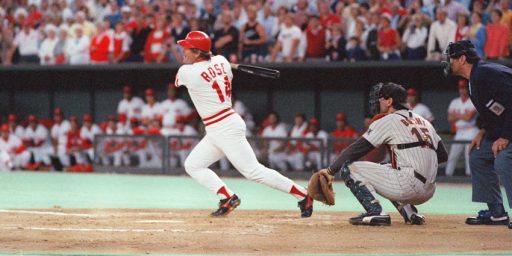McCain Threatens Baseball Over Drugs
McCain Threatens Baseball Over Drugs (WaPo A01)
As Major League Baseball’s steroid scandal widened to include the sport’s most prolific active home run hitter, Senate Commerce Committee Chairman John McCain (R-Ariz.) said yesterday that he will introduce legislation imposing drug testing standards on professional athletes if baseball players and owners do not adopt a stringent crackdown on steroids by January.
In the wake of the disclosure that San Francisco Giants slugger Barry Bonds used substances provided him by a trainer who has been indicted in a steroid distribution ring, McCain, in an interview, gave baseball until next month to adopt the more stringent drug testing requirements of minor league baseball or face federal action.” Major league baseball players and owners should meet immediately to enact the standards that apply to the minor leagues, and if they don’t, I will have to introduce legislation that says professional sports will have minimum standards for testing,” McCain said after returning from a European trip late yesterday. “I’ll give them until January, and then I’ll introduce legislation.”
Under the threat of federal intervention, Major League Baseball officials promised rapid action to impose stringent drug testing. Commissioner of Baseball Bud Selig brought up the steroid issue on a conference call with representatives of the 30 major league franchises yesterday, a call originally scheduled to approve the relocation of the Montreal franchise to Washington. According to two sources familiar with the phone discussion, Selig reiterated what he had said on Thursday in Washington — that baseball needs a tougher steroid policy, and that he intends to have something new in place by January, when team owners convene for meetings.
Selig told the representatives during yesterday’s phone call that the league and the players’ union had been making progress on a new, tougher drug policy when the latest drug scandal erupted. Selig said if the sport did not have a new policy in time for spring training it may take more aggressive public action, although he was not specific. Selig urged the players’ union yesterday to advance a policy aimed at abolishing the use of illegal drugs in baseball. “I am aware the Major League Baseball Players Association is having its annual meeting with its executive board of player representatives next week,” Selig said in a statement issued yesterday. “I urge the players and their association to emerge from this meeting ready to join me in adopting a new, stronger drug testing policy modeled after our minor league program that will once and for all rid the game of the scourge of illegal drugs.”
In grand jury testimony that was leaked this week, New York Yankees slugger Jason Giambi admitted to three years of steroid use, and Bonds admitted using similar substances, although he said he did not think they were steroids.
It is unlikely that drug testing would have prevented the most recent scandal. Bonds and Giambi used substances that were not detectable by standard Olympic drug tests, according to a San Francisco Chronicle report on their federal grand jury testimony.
McCain’s threat to impose drug testing standards on professional athletes — Congress has the authority under the U.S. Constitution’s interstate commerce clause — significantly escalates a long-simmering battle between the federal government and the national pastime over drug use. President Bush, in January’s State of the Union address, called on owners, unions and players “to get tough and to get rid of steroids now.” But White House efforts to organize a conference on the matter between players and owners fell apart after the baseball’s players’ union objected.
As regular readers would expect, I’m skeptical of Congress’ role in regulating the internal affairs of a private business. Furthermore, it’s entirely unclear to me how the government could impose mandatory drug testing on baseball players without violating the 4th Amendment. (Although, granted, the traditional sanction is just exclusion of the tainted evidence from court, which wouldn’t apply here.)
Giblets sarcastically notes “the vital role steroid abuse plays in the drug war and the escalating crime rates that accompany it. The other day Giblets saw Barry Bonds knock over a seven-eleven to pay for human growth hormones.” Jeralyn Merritt thinks a more productive use of the Senate’s time would be investigating “who leaked Bonds’s grand jury testimony?”
I agree with McCain and the president that steroids in professional sports is an important issue, if nothing else because of the trickle down effect on the rest of society. Because athletes are worshipped as heroes, not to mention paid princely sums, a sizable portion of our young people aspire to follow in their footsteps. Surveys have consistently showed that young athletes would be willing to sacrifice a few years off the back end of their lives if they could win an Olympic gold medal, a Super Bowl ring, or other such honors. Further, if even a small percentage of professional athletes are advancing their careers through use of such drugs, it increases the pressure on others to do the same to merely stay even.
While I agree with Jeralyn that Congress–or someone–should investigate the increasing tendency of grand jury proceedings (not to mention classified national security information) to get leaked into the press, the two tracks aren’t mutually exclusive. The proper path, however, is Bush’s rather than McCain’s. Government leaders should call attention to the issue to increase pressure on Major League Baseball to clean up its own mess; it shouldn’t legislate mandatory drug testing.





I would think at the very least Congress had some input into MLB because of the anti-trust exemption – so the appropriate thing Congress could do if they were concerned would be to vote to lift it.
Once again McCain is grandstanding in his long pattern of seeking publicity for publicity’s sake–he is pretty much the right wing Jesse Jackson, latching on to whatever issue is prominent in the news and putting forth ill-conceived “solutions” to perceived problems (e.g. McCain-Feingold–a fraud of a law, if there ever was one).
“I agree with McCain and the president that steroids in professional sports is an important issue, if nothing else because of the trickle down effect on the rest of society.”
If this was really one of the more important issues facing society, I would be extremely happy. Unfortunately, it has absolutely no bearing on anyone’s life.
The whole “trickle-down” argument is specious. It is the same argument that superstitious shamans like Jerry Falwell and Bush use to talk about the “gay agenda” and that if people are exposed to a frank discussion of sexuality, birth control, or other issues, they will “turn gay” or be promiscuous.
This whole standpoint is insulting to people’s intellegence and a failure to recognize individual rational capacities. But this elitist posturing shouldn’t be surprising given the discounting of reality that guides what passes for “thinking” by many of our political leaders.